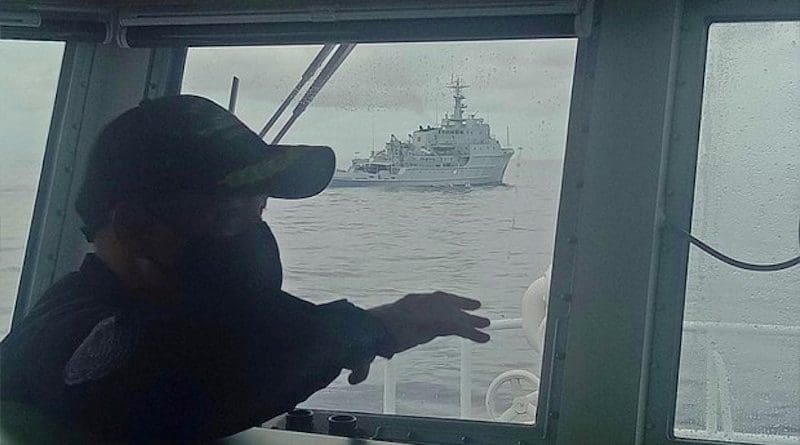AUKUS Fallout Prod Philippines’ Rethink – Analysis
The Philippines was the first Southeast Asian country to formally articulate support for the controversial Australia-United Kingdom-United States (AUKUS) trilateral security deal. Whether that position stays is up for debate, as President Rodrigo Duterte echoed concerns raised by neighbors Indonesia and Malaysia and called for a cabinet meeting to discuss the matter. A reversal will allign the three principal founding fathers of the Association of Southeast Asian Nations (ASEAN) in collective concern that the new minilateral may trigger a regional arms race and elicit a reaction from Beijing.
Four days after AUKUS was announced and nine days after his trip to Washington, Philippine Foreign Affairs Secretary Teodoro Locsin issued a statement welcoming Canberra’s move to deepen security ties with the U.S. and UK. Countries in Southeast Asia, individually or collectively, do not have the means to address the growing power asymmetry in the region as China continues to rise. Hence, Locsin said that AUKUS enhances “an ASEAN near friend and ally’s military capacity to respond in timely and commensurate fashion to a threat to the region or a challenge to the status quo.” “Proximity breeds brevity in response time” so Australia stepping up can complement and help offset the region’s chief balancer, the U.S., being an ocean away. This setup, he argues, “should restore and keep the balance rather than destabilize it.” But not everyone in the region has bought into the pitch.
While the assessment of China’s burgeoning military capacity, including its rapid and well-resourced naval modernization, is held with unanimity, the region has yet to reach a firm consensus on how to respond to it. AUKUS, like the Quadrilateral Security Dialogue (Quad), may have been born precisely out of this frustration. But despite the territorial and maritime row with Beijing, the idea of equipping Australia with nuclear-powered submarines to counter China was not as enthusiastically received in other regional capitals. Expressions of concerns, calls, and requests for briefings betray a strong sense of disquiet with the deal. Malaysia even plans to dispatch a delegation to China to discuss the recent development. The region’s unease stems from the recognition that this latest move will undoubtedly invite a Chinese reaction. They know fully well that any untoward incident arising from increased power projection by competing players will likely occur in the region’s waters and airspace, including in the contested South China Sea.
Six days before the AUKUS announcement, Indonesia and Australia held their seventh 2+2 defense and foreign ministerial dialogue in Jakarta. It is arguable whether Canberra had confided to ASEAN’s informal leader the upcoming deal, or perhaps Jakarta just picked up the scent and knew something big would happen. Regardless, Indonesia still conveyed serious apprehension about triggering an arms buildup in an already tense region. This is especially true as the twin woes of a more virulent coronavirus strain and economic malaise top the bloc’s agenda. Like the U.S.’ Indo-Pacific strategy and the crisis in Myanmar, the ruckus over AUKUS may thrust ASEAN to undertake reactionary consultations, convene a meeting or release a statement. Whichever road it takes, Indonesia will certainly play an indispensable role. An ASEAN reiteration of its desire to be a zone of peace, freedom, and neutrality and repudiation of nuclear weapons and associated defense technologies may be taken as a subtle rebuff of the new minilateral.
For its part, the Philippines’ decision to review its initial stand on AUKUS reflects the high importance it assigns to ASEAN in its foreign policy. Duterte visited all Southeast Asian capitals in his first nine months in office. His country’s home region was the most frequent destination of his foreign travels, netting 19 trips in total from 2016 to 2019. Under his watch, the country’s foreign affairs department created a new office – Undersecretary for Bilateral Relations and ASEAN Affiairs – last year. The South China Sea, a focal point for AUKUS, is also a top national security and foreign policy issue. Alongside naval and coast guard modernization and upgrading facilities in its administered features in the disputed sea, the country also pursued high-level diplomacy with its fellow claimants. Duterte toured all the sea’s littoral states within his first five months in office and made five visits to the sea’s biggest claimant and the country’s largest trade partner, China. Manila opened dialogue with Beijing on the flashpoint, convening six high-level meetings. Coast guard officials of both sides also met three times. Assuming the role of the ASEAN-China country coordinator from 2018-2021, Manila pushed for the early conclusion of an effective Code of Conduct, negotiations of which were stalled by the pandemic. Concern about how the AUKUS would impact all these bilateral and regional efforts and whether it will sideline ASEAN in shaping the regional security architecture is at the heart of Manila’s reservations over the new tripartite security partnership. Its neighbors share this predicament.
Locsin’s endorsement may have stirred ripples within ASEAN, and the ruckus may have caused the country to backpedal. In the ASEAN Foreign Ministers Meeting held virtually last October 4, Philippine Foreign Affairs Acting Undersecretary Theresa Lazaro said that the country will “continuously assess” AUKUS and “welcome efforts made by the countries concerned to explain it further.” Notwithstanding its initial stance, the country neither wants to be seen as getting ahead of ASEAN nor speaking on its behalf, especially absent consultations. Likewise, it does not wish its statement to be construed as promoting an external partner’s position. Convening a full cabinet meeting and working closely with its neighbors may be intended to soothe ruffled feathers, and may also help facilitate talks to reach a common ASEAN understanding on AUKUS.
This article was published by China-US Focus

